5. Fahrenheit 451 (Francois Truffaut, 1966)
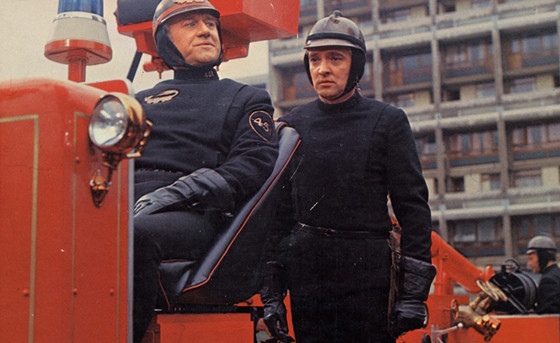
As Orwell shows in 1984 the one who controls education, controls the people’s minds. Books and literature are one of the biggest forms of education and were always a fantastic platform for free and critical thinking; and thus Big Brother had a whole department responsible for mediating history books and old newspapers similar to books threatening the Nazi regime being burnt under the rule of Hitler.
Fahrenheit 451 is a movie adaptation to Ray Bradbury’s novel of the same name sets itself in a dystopian society of a futuristic America where books and literature are illegal as they promote free thinking – and it is a fireman’s duty to burn everything at 451 degrees Fahrenheit to make sure that all books are destroyed. The movie follows Guy Montag (Oskar Werner), one of such firemen instructed to burn possessions of anybody who keeps illegal books.
After meeting his new liberal neighbour Clarisse (Julie Christie), he begins to question his life, job and beliefs putting his life in danger after he begins to steal and read the outlawed literature.
4. Metropolis (Fritz Lang, 1927)
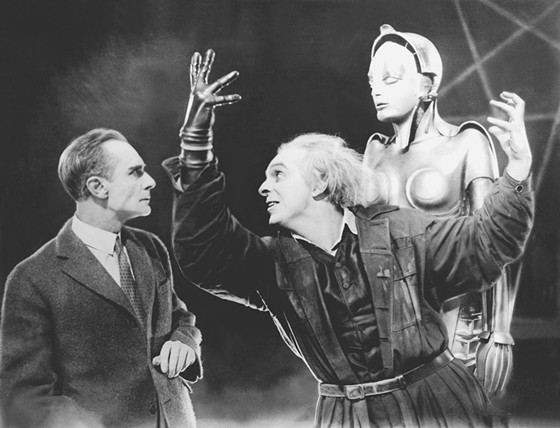
Made even before Orwell’s 1984, Metropolis has become one of the biggest and most important movies in cinematic history, a movie and setting that influenced many movies to come.
The film shows the Metropolis, a futuristic rich city filled with towers and all sorts of fantastic architecture; many feet below however lies another city – that of the working class, full of labourers that slave their days away for the benefit of the upper class that thrive from this system, led by the Master of Metropolis.
The plot follows the son of the Master, Freder (Gustav Frohlich), who falls in love with Maria (Brigitte Helm), a child carer from underground. During his search in the unknown territory he discovers the terrible conditions of the workers that are controlled to keep the city’s machines running, and after witnessing the ignorance of his father decides to help rebel against the Metropolis.
A movie filled with robots, machines and a lot of visual and special effects that were outstanding for the times, never looses its deeper meaning of dictatorship and class structure that was such an important critique considering the events to follow 10 years later.
3. The Lobster (Yorgos Lanthimos, 2015)
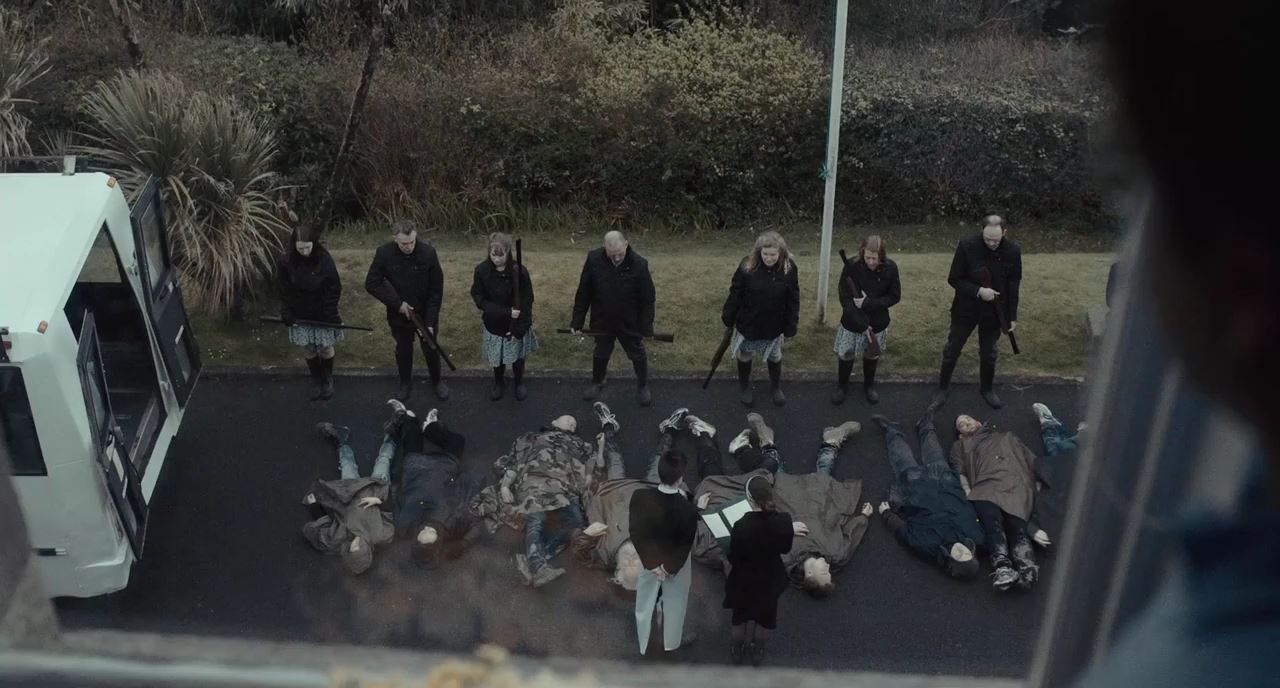
The English language debut feature of Yorgos Lanthimos is a dark-humoured comedy critiquing the status of relationships. Whereas in ‘1984’ emotional relationships were banned, The Lobster criminalises single people, creating a law where one who is single for over 45 days gets turned into an animal of their choice.
The movie follows David (Colin Farrell) who is recently dumped as he checks into a facility that will help him find a new partner and consequently save his life. After several attempts to pair up, David realises he has no chance there and escapes into the woods to join the ‘Loners’ group.
Here, the rules seem to be even stricter, as the the Loners’ leader (Lea Seydoux) bans any inappropriately affections between the members through violent means. Ironically it is here that David finds a suitable partner (Rachel Weisz) and the two become outsiders to both regimes.
Lanthimos uses this movie to put attention not only on the way society treats coupled and married people compared to those that are single, as he makes the comparison of the characters having to walk around town in couples in order to not be stopped by the police, but also shows just how easily manipulated humans are due to our need to ‘follow the norm’, whatever that norm may be.
2. THX 1138 (George Lucas, 1971)
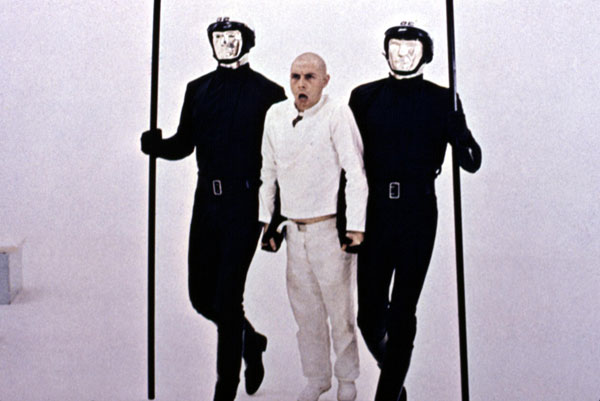
A key theme is Orwell’s novel is the controlling of emotions that is in fact banned under the rule of Big Brother, as they are a threat to his reign. In the futuristic drama THX 1138 George Lucas sets his movie in an underground city were emotions and freedom are banned through mandatory drugs.
The plot follows two citizens, THX 1138 (Robert Duvall) and LUH 3417 (Maggie McOmie) who rebelliously stop taking the medication and experience love for each other which is just as illegal as love making in which they engage, causing them to become renegades and outlaws trying to escape the robotic army out to destroy them.
Lucas once again shows how dangerous freedom of society can be to a totalitarian regime and that even the kindest emotions like love are an extreme threat to those in power.
1. Nineteen Eighty-Four (Michael Radford, 1984)
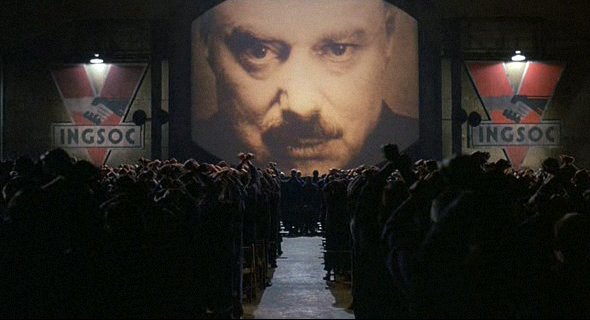
Based on Orwell’s book itself, the movie follows the protagonist Winston Smith (John Hurt) through the dystopian, broken down world he lives in.
The movie masterfully replicates the events of the book as Winston lives his life in the history department, changing newspaper headlines and erasing all photographs of “unpersons” that had become a threat to the government, he attends Big Brother support rallies and listens to the never ending reports about the world war that is supposedly still happening.
All of this continues until he recieves a note from a co-worker, Julia (Suzanna Hamilton) with three words that change his life, if not forever then for some time; “I love you” it reads. In a state where love is not allowed, Winston and Julia rebelliously embark on a revolutionary journey of love, sex and forbidden contraband jam, the overwhelming of which makes Winston trust the wrong people.
Unlike the 1954 version of the film/novel, Radford explores and unravels the terrifying darkness that Orwell creates with his totalitarian state and society with no freedom, creating speculation in regards to the blurring of the fictitious line.
Author Bio: Polina is an aesthete and cinephile, devoted to using the arts to revive “sex, drugs and rock’n’roll” in hopes of loosening up the world by defying the unnecessary social restrictions. When taking time off her edgy crusade she can be found soaking in a bubble bath with a Dostoevsky novel.